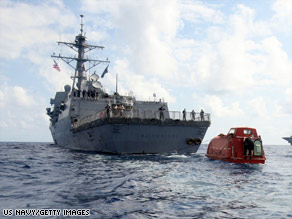
The alleged pirate apprehended by the U.S. Navy after the hijacking of the Maersk Alabama is en route to New York, according to defense officials.
He was handed over to federal authorities by the U.S. military in Djibouti, the officials said. The suspected pirate, known in official documents as “Pirate Defendant,” was brought to Djibouti aboard the USNS Walter S. Diehl, a refueling ship that was with the warship USS Bainbridge at the scene of the failed hijacking that turned into a hostage ordeal 350 miles off the Somalian coast. Three pirates who were holding the Maersk Alabama’s captain in the ship’s lifeboat were killed by Navy SEALs. The survivor had surrendered and was aboard the Bainbridge when the captain, Richard Phillips, was rescued, officials said. From the Bainbridge, he was transferred to the USS Boxer for medical treatment. He was wounded when crew members of the Maersk Alabama took him hostage in the early hours of the pirate attack on the cargo ship, according to the military. See an interactive map of 2009 pirate attacks off the Horn of Africa »
Don’t Miss
Pirates attack U.S. cargo ship but fail to get aboard
Pentagon looks to move battle against pirates ashore
Commentary: Take fight to the pirates
The crew members had hoped to exchange him for their captain, but the pirates did not release Phillips when the crew returned their captive. “I’m mad because, you know, I could have been dead right now,” Ken Quinn, the Maersk Alabama’s navigation officer, told CNN Radio Monday. “But at the same time he’s just a little skinny guy, you know, from Somalia where they’re all starving and stuff.”
Quinn said he wasn’t angry at the single alleged pirate, noting piracy in the region is fueled by the desire to survive hardship and poverty. He said the suspect told him he wanted to go the United States, and asked whether Quinn could help him get there. “I said, ‘Yeah, you’re probably going to go anyway — I don’t think you’re going to need my help,’ ” Quinn said. “If he goes to jail here, it will be a whole lot better than living in Somalia.”